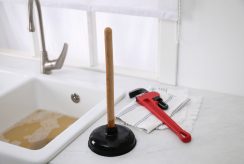Keeping up with daily sweeping and mopping prevents dirt build-up that dulls the shine of epoxy floors. Using a soft broom or microfiber mop with a pH-balanced cleaner is ideal.
Spill management is key, so that chemicals like antifreeze, oil or paint are wiped up immediately. Stains and spots can also be gently scrubbed with a kitchen sponge or scrub brush and warm water.
Clean Often
Taking care of your epoxy flooring is a critical aspect of protecting and preserving its immaculate appeal and functionality. A regular cleaning and maintenance regimen, as outlined in this in-depth guide, will help to ensure that your floors remain shiny and beautiful for years to come.
To start with, you should sweep or vacuum the floor on a daily basis to remove loose dirt and debris. This will lessen the likelihood of it becoming crushed into the floor and causing damage or scratching. Using a hard foam mop with warm or hot water will then take care of any residue that has developed. It is advisable to use a pH-neutral, non-abrasive cleaner that has been specifically designed for use on epoxy surfaces to avoid deterioration of the coating.
It is also important to react quickly when any spills or stains develop, larger flakes can offer a more textured look. While the non-porous nature of the epoxy provides a temporary defense against stains, procrastination can cause permanent damage. If a stain does occur, it is best to dab at the spot rather than rub it. After doing this, a quick rinse with clear water will ensure that the area is clean and that any remaining marks are washed away.
Additionally, you should perform routine inspections to check the condition of the seals and joints. Any deterioration may allow moisture to penetrate the surface and cause bubbling or lifting. These inspections will also enable you to identify any minor damage or scratches before they escalate into a bigger issue.
Other preventive measures include installing door mats at entrances to capture abrasive dirt and grit, which will then be trapped in the mat and prevented from being swept or rubbed into the floor. Furthermore, utilising dollies or sliders beneath large machinery and furniture will lower the stress exerted on the epoxy flooring, thereby lessening the chance of damage from sudden movements. Alternatively, you could even consider installing polyurethane or rubber wheels on equipment and furniture to further protect the surface from dents and scuffs. This is particularly useful in places with high vehicular traffic or heavy equipment usage.
Avoid Harsh Detergents
Using abrasive cleaning products like harsh solvents or scouring pads is one of the biggest mistakes you can make when maintaining epoxy floors. Abrasive cleaners wear away at the epoxy’s smooth, sealed surface, dulling its luster and exposing the underlying concrete, which can then absorb water and corrode the surface coating. Instead, opt for a specialized gentle cleanser that’s designed specifically for use on epoxy surfaces.
The frequency with which you clean your floor will depend on how heavily it’s used, but sweeping daily in high-traffic areas and weekly or more often in lower-traffic zones will keep dust, grit, dirt, and other debris at bay. A broom with soft bristles or a microfiber mop works best for this job. It’s also important to promptly clean up any spills and stains to avoid staining the surface.
A moderate cleaning solution of mild detergent and warm water is all you need to remove grease and oily residue from your epoxy floor. However, you should never use actual soap on an epoxy surface, as it leaves a film that’s difficult to rinse and can leave behind a slippery, sticky mess. Likewise, floor stripping agents, citrus-based cleaners, and acidic chemicals are not recommended for use on an epoxy surface because they can damage the coating.
In addition to keeping your floors free of abrasive particles, it’s also a good idea to place walk-off mats at entrances to catch debris and dirt before it’s tracked onto the epoxy. You should also consider placing pads under furniture legs and hard-wheeled equipment, like forklifts, to prevent scratches and gouges.
Taking these proactive steps to protect your epoxy floor will greatly extend its life. It’s also a good idea to do a quarterly assessment of your floors and look for signs of damage, such as fine cracks, peeling, or discoloration that can indicate the need for a new coat of protection. By following these dos and don’ts of maintaining epoxy floors, you can enjoy the benefits of a strong, long-lasting, and visually appealing work area for years to come.
Avoid Excessive Water
Using too much water when cleaning your epoxy floor could damage the coating and cause it to become scratched or discolored. Over-watering also leads to puddles and pools that can seep into unsealed areas of the floor, causing moisture damage and potentially delaminating the epoxy. Lastly, it’s important to dry the floor completely after a cleaning to avoid water spots and residue that can dull the epoxy’s shine.
Epoxy floor coatings are extremely durable and long-lasting, but they can be damaged by accidental abuse or poor care. Scratches and dents in the surface can be repaired by a professional with a putty knife or a small amount of epoxy patching compound. Affected areas should be sanded down to remove the damaged layer before applying a new layer of epoxy.
To prevent scratches, stains and other damage to the floor, it’s important to clean equipment and tools thoroughly before moving them across the epoxy coating. Using a walk-off mat at the entrance of your garage or shop can help capture dirt, grit and other debris before it can reach your floors. You can also use foam pads under the feet of heavy machinery, vehicles and tools to prevent damage to the surface.
It’s also crucial to regularly inspect the floor for signs of wear and tear, especially in high-traffic areas. Look for cracks, chips and dents that should be repaired as soon as possible to preserve the strength and beauty of the epoxy floor.
If you’re unsure of how to properly care for your epoxy floors, or are interested in having them repaired by a professional, contact a local specialist that specializes in commercial and residential flooring services. They can advise you on the best practices for maintaining your floors, including how to clean and care for them and which products are safe and effective. Hiring a reputable specialist to handle your floor maintenance will ensure that your epoxy floors last for years to come!
Avoid Scratches

Epoxy flooring is extremely durable and long-lasting when it’s properly cared for. However, it can be susceptible to damage if not cared for correctly. Often, these damages can go unnoticed until it’s too late to repair them. This can cause the epoxy to become dull and lose its shiny appearance. The good news is that preventing these damages can be as simple as following some basic maintenance tips for your epoxy floor coating.
The most important way to prevent abrasions and scratches on an epoxy surface is to sweep frequently. Sweeping will keep dust, sand and grit from embedding into the epoxy and scratching or etching it. This should be done daily in high traffic areas and weekly in less trafficked areas. It is also a good idea to put down rugs and furniture to further protect the epoxy floors from scratching and dents.
It is also critical to clean spills immediately to prevent staining. Using a mild detergent or pH-neutral cleaner diluted with warm water is the best option for cleaning an epoxy floor. For particularly tenacious spills, such as engine oil, you can use a concrete degreaser to soak the marks, scrub them with a nylon brush and then rinse the floor thoroughly.
Finally, it is also essential to make sure that large machinery or pallets are not dragged across an epoxy floor. This can cause scuffs and small cracks in the coating, which then lead to abrasions. It’s recommended to use a wheel guard or felt cover on equipment and a jack or hoist when moving it around on an epoxy floor.
All of these preventative measures can help extend the life of your epoxy floor and ensure that it stays looking its best for years to come. These steps are especially vital in industrial and commercial environments, where the flooring is constantly exposed to heavy wear and tear. Taking these steps can save you a lot of time and money in the long run, by protecting your investment in your epoxy flooring and prolonging its life. Contact us to discuss your specific needs and to learn more about the best ways to maintain your epoxy floors.





